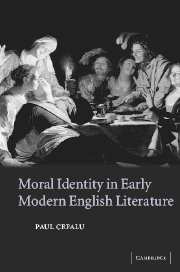Book contents
- Frontmatter
- Contents
- Acknowledgments
- Introduction: English Protestant moral theory and regeneration
- Chapter 1 Shame, guilt, and moral character in early modern English Protestant theology and Sir Philip Sidney's Countess of Pembroke's Arcadia
- Chapter 2 The three orders of nature, grace, and law in Edmund Spenser's The Faerie Queene, Book II
- Chapter 3 Conformist and puritan moral theory: from Richard Hooker's natural law theory to Richard Sibbes's ethical occasionalism
- Chapter 4 The elect body in pain: Godly fear and sanctification in John Donne's poetry and prose
- Chapter 5 Absent neighbors in George Herbert's “The Church,” or Why Agape becomes Caritas in English Protestant devotional poetry
- Chapter 6 Moral pragmatism in the theology of John Milton and his contemporaries
- Epilogue: theorizing early modern moral selfhood
- Notes
- Index
Chapter 2 - The three orders of nature, grace, and law in Edmund Spenser's The Faerie Queene, Book II
Published online by Cambridge University Press: 22 September 2009
- Frontmatter
- Contents
- Acknowledgments
- Introduction: English Protestant moral theory and regeneration
- Chapter 1 Shame, guilt, and moral character in early modern English Protestant theology and Sir Philip Sidney's Countess of Pembroke's Arcadia
- Chapter 2 The three orders of nature, grace, and law in Edmund Spenser's The Faerie Queene, Book II
- Chapter 3 Conformist and puritan moral theory: from Richard Hooker's natural law theory to Richard Sibbes's ethical occasionalism
- Chapter 4 The elect body in pain: Godly fear and sanctification in John Donne's poetry and prose
- Chapter 5 Absent neighbors in George Herbert's “The Church,” or Why Agape becomes Caritas in English Protestant devotional poetry
- Chapter 6 Moral pragmatism in the theology of John Milton and his contemporaries
- Epilogue: theorizing early modern moral selfhood
- Notes
- Index
Summary
Recent accounts of the interplay of ethics and theology in The Faerie Queene have no doubt improved upon A.S.P. Woodhouse's belief that the poem allegorizes a disjuncture between the two orders of nature and grace. Revising Woodhouse's argument that Book I moves on the religious level, while Book II moves on the natural level, Spenserians have argued variously that Book II depicts a syncretic via media of Christian humanism, that Guyon's embodiment of Christian temperance is restricted to the latter half of his quest toward the Bower of Bliss, and that Guyon allegorizes a sanctified Protestant moral agent, one whose works-righteousness follows rather than precedes justification in the ordo salutis. Despite the diversity of such readings, the significant revisions of Woodhouse's thesis tend either to harmonize classical virtue theory and Protestantism, or to privilege Protestantism over classical ethics by noting the presumptuousness of Aristotelianism from the vantage point of English Calvinism. Yet no discussion of Book II has considered the possibility that Spenser allegorizes the failure of Pauline theology to offer a sound theory of virtuous training that can substitute for Aristotelian behaviorism.
In the following chapter, I assess in more detail the significant points of similarity and contrast between Aristotelian moral education and Reformed accounts of moral renewal. As we have begun to see, much of the Reformation animus toward Aristotelian ethics centers on Aristotle's foundational notion, described throughout the Nicomachean and Eudemian ethics, that the moral virtues and prudence are acquired by habituation and repetitive rightful conduct.
- Type
- Chapter
- Information
- Moral Identity in Early Modern English Literature , pp. 47 - 76Publisher: Cambridge University PressPrint publication year: 2004



